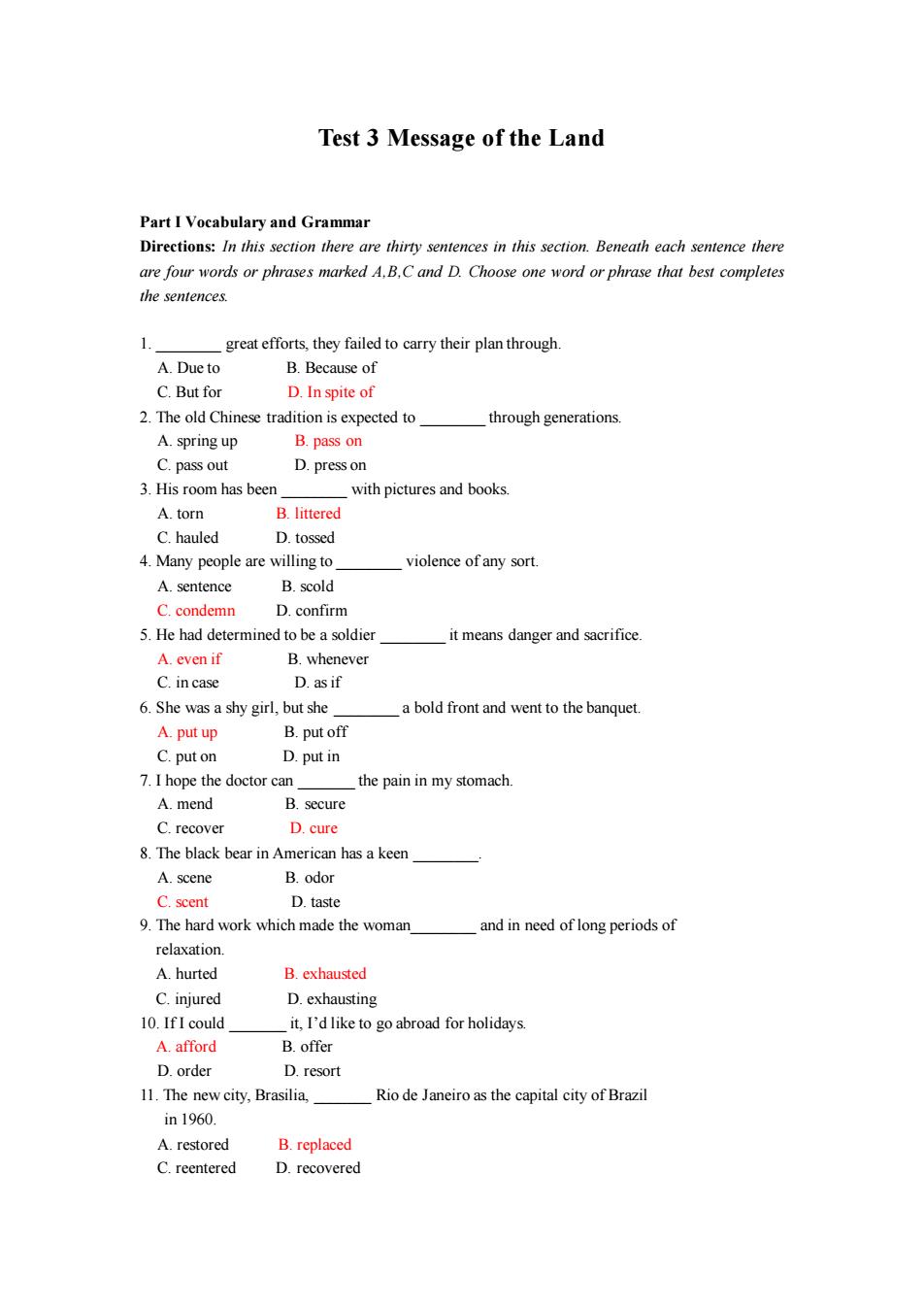
Test 3 Message of the Land Part I Vocabulary and Grammar Directions:In this section there are thirty sentences in this section.Beneath each sentence there ird Cn D Cooe onephcm great efforts,they failed to carry their plan through A Dueto B Because of C.But for D In spite of 2.The old Chinese tradition to through generations A.spring up B.pass on C.pass out D.press on 3.His room has been with pictures and books A torn B.littered C hauled D tossed 4.Many people are willing to violence of any sort A.sentence B.scold C.condemn D.confirm 5.He had determined tobe a soldier it means danger and sacrifice. A even if B.whenever D.asif 6.She was a shy girl,but she a bold front and went to the banquet A.put up B.put off C.put on D.put in 7.I hope the doctor can the pain in my stomach A.mend B.secure C.recove D.cure 8.The black bear in American has a keen. A.scene B.odor C.scent D taste 9.The hard work which made the woman and in need of long periods of A.hurted C.injured D.exhausting 10.IfI could it,I'd like to go abroad for holidays. A.afford B.offer D.order D.resor 11.The newcity,Brasilia, Rio de Janeiro as the capital city of Brazil in1960 A.restored B.replaced C.reentered D.recovered
Test 3 Message of the Land Part I Vocabulary and Grammar Directions: In this section there are thirty sentences in this section. Beneath each sentence there are four words or phrases marked A,B,C and D. Choose one word or phrase that best completes the sentences. 1. _ great efforts, they failed to carry their plan through. A. Due to B. Because of C. But for D. In spite of 2. The old Chinese tradition is expected to _ through generations. A. spring up B. pass on C. pass out D. press on 3. His room has been _ with pictures and books. A. torn B. littered C. hauled D. tossed 4. Many people are willing to _ violence of any sort. A. sentence B. scold C. condemn D. confirm 5. He had determined to be a soldier _ it means danger and sacrifice. A. even if B. whenever C. in case D. as if 6. She was a shy girl, but she _ a bold front and went to the banquet. A. put up B. put off C. put on D. put in 7. I hope the doctor can _ the pain in my stomach. A. mend B. secure C. recover D. cure 8. The black bear in American has a keen _. A. scene B. odor C. scent D. taste 9. The hard work which made the woman_ and in need of long periods of relaxation. A. hurted B. exhausted C. injured D. exhausting 10. If I could _ it, I’d like to go abroad for holidays. A. afford B. offer D. order D. resort 11. The new city, Brasilia, _ Rio de Janeiro as the capital city of Brazil in 1960. A. restored B. replaced C. reentered D. recovered
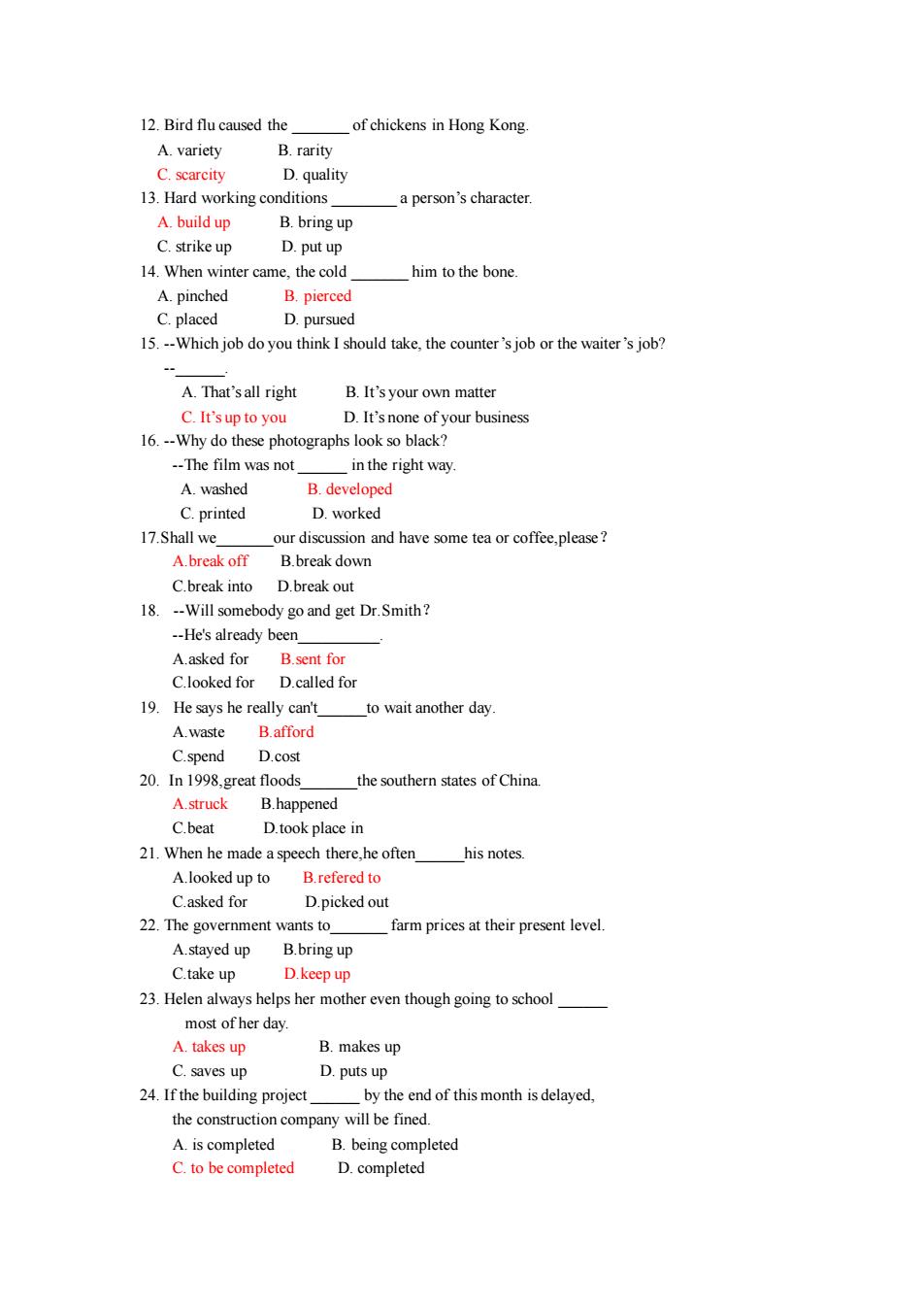
12.Bird flu caused the of chickens in Hong Kong A.variety B.rarity C.scarcity D.quality 13.Hard working conditions a person's character. A.build up B.bring up C.strike up D.put up 14.When winter came,the cold him to the bone A.pinche C.placed D.pursued 15.-Which job do you think I should take,the counter's job or the waiter's job? A.That'sall right B.It's your own matter C.It'supto you D.It'snone of your busines 16.-Why do these photographs look so black -The film was not in the right way A washed B.developed C printed D worked 17 Shall w n and have some tea or coffee,please? A.break off C.break into D.break out 18.-Will somebody go and get Dr.Smith? -He's already been A asked for B sent for C.looked for D.called fo 19.He says he really can't to wait another day A waste B.afford C snend 20 In 1998 great floods the southern states of china A struck C.beat D.tookplace in 21.When he made a speech there he often his notes A.looked up to B.refered to C asked for D.picked out 22.The gov ment wants to farm prices at their present level. A.stayed up C.take up D.keep up 23.Helen always helps her mother even though going to school most of her dav. A.takes up B makes up C.saves up D.puts up 24.If the building project by the end of this month is delayed. the construction company will be fined. A.is completed B.being completed C.to be completed D.completed
12. Bird flu caused the _ of chickens in Hong Kong. A. variety B. rarity C. scarcity D. quality 13. Hard working conditions _ a person’s character. A. build up B. bring up C. strike up D. put up 14. When winter came, the cold _ him to the bone. A. pinched B. pierced C. placed D. pursued 15. -Which job do you think I should take, the counter’s job or the waiter’s job? -_. A. That’s all right B. It’s your own matter C. It’s up to you D. It’s none of your business 16. -Why do these photographs look so black? -The film was not _ in the right way. A. washed B. developed C. printed D. worked 17.Shall we_our discussion and have some tea or coffee,please? A.break off B.break down C.break into D.break out 18. -Will somebody go and get Dr.Smith? -He's already been_. A.asked for B.sent for C.looked for D.called for 19. He says he really can't_to wait another day. A.waste B.afford C.spend D.cost 20. In 1998,great floods_the southern states of China. A.struck B.happened C.beat D.took place in 21. When he made a speech there,he often_his notes. A.looked up to B.refered to C.asked for D.picked out 22. The government wants to_ farm prices at their present level. A.stayed up B.bring up C.take up D.keep up 23. Helen always helps her mother even though going to school _ most of her day. A. takes up B. makes up C. saves up D. puts up 24. If the building project _ by the end of this month is delayed, the construction company will be fined. A. is completed B. being completed C. to be completed D. completed
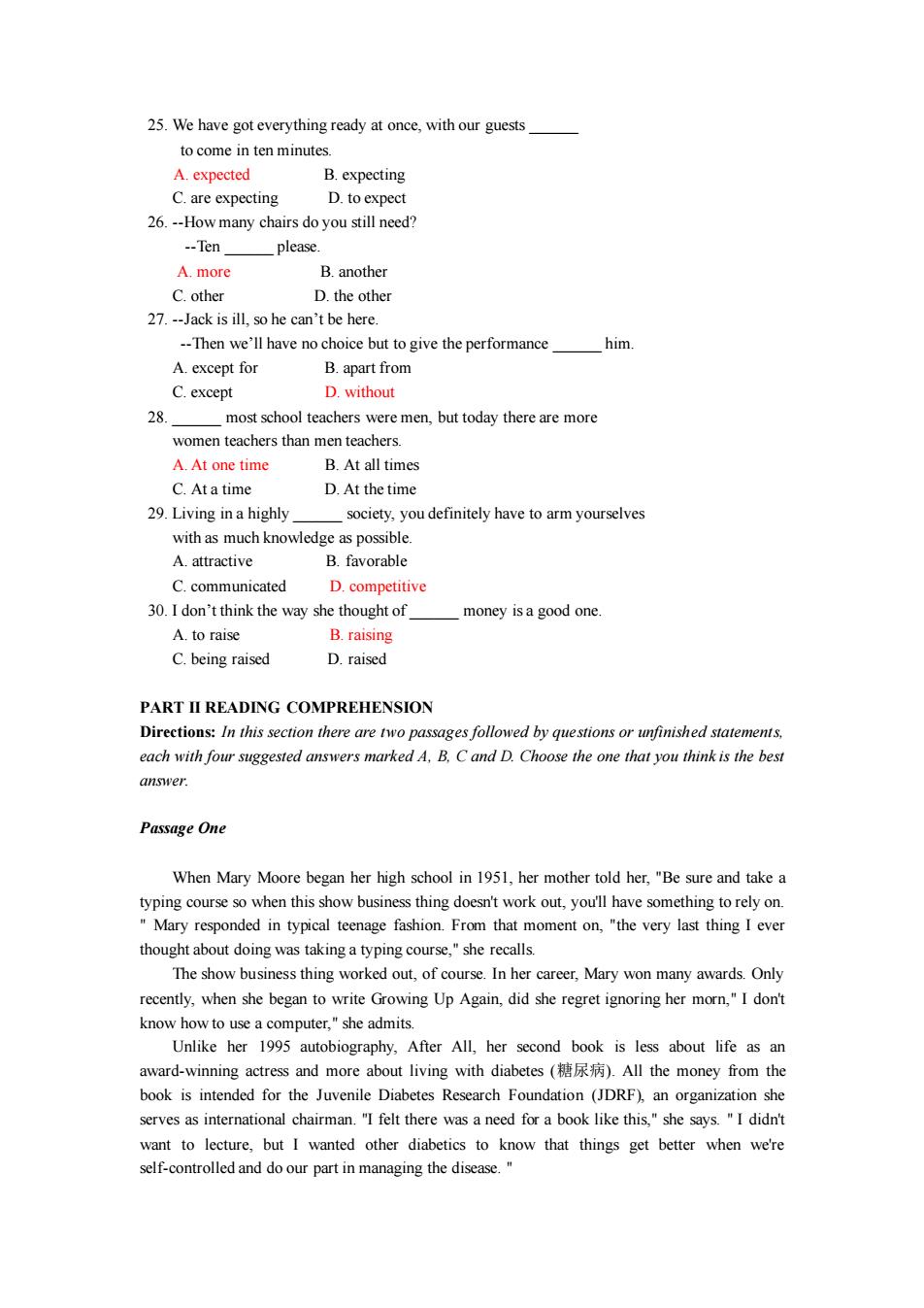
25.We have got everything ready at once,with our guests to come in ten minute B.expecting C.are expecting D.to expect 26.-How many chairs do you still need? -Ten please A.more B.another D. the othe -Then we'll have no choice but to give the performance him. A.except for B.apart from C except D.without schoolteacher but today there A.At one time B.At all times C.Ata time D.At the time 29.Living in a highly society.you definitely have to arm yourselves C.communicate D.competitive 30.I don't think the way she thought of money is a good one. A to raise B raising C.being raised D.raised PART II READING COMPREHENSION Directions:In this section there are two passages followed by questions or unfinished statements. each with four suggested answers marked A.B.Cand D.Choose the one that you think is the best answer. Passage One When Mary Moore began her high school in 1951.her mother told her."Be sure and take a typing course so when this show business thing doesn't work out,you'll have something to rely on. Mary responded in typical teenage fashion.From that moment on,"the very last thing I ever thought ut doing w takinga typing recalls The show business thing worked out,of course.In her career,Mary won many awards.Only recently.when she began to write Growing Up Again,did she regret ignoring her morn,"I don't know how to use a computer,"she admits. Unlike her 1995 autobiography.After All,her second book is less about life as an award-winr actress and mor s(糖尿病).All the money from book is intended for the Juvenile Diabetes Research Foundation (JRF)an organization serves as international chairman."I felt there was a need for a book like this,"she says."I didn't want to lecture,but I wanted other diabetics to know that things get better when we're self-controlled and do our part in managing the disease
25. We have got everything ready at once, with our guests _ to come in ten minutes. A. expected B. expecting C. are expecting D. to expect 26. -How many chairs do you still need? -Ten _ please. A. more B. another C. other D. the other 27. -Jack is ill, so he can’t be here. -Then we’ll have no choice but to give the performance _ him. A. except for B. apart from C. except D. without 28. _ most school teachers were men, but today there are more women teachers than men teachers. A. At one time B. At all times C. At a time D. At the time 29. Living in a highly _ society, you definitely have to arm yourselves with as much knowledge as possible. A. attractive B. favorable C. communicated D. competitive 30. I don’t think the way she thought of _ money is a good one. A. to raise B. raising C. being raised D. raised PART II READING COMPREHENSION Directions: In this section there are two passages followed by questions or unfinished statements, each with four suggested answers marked A, B, C and D. Choose the one that you think is the best answer. Passage One When Mary Moore began her high school in 1951, her mother told her, "Be sure and take a typing course so when this show business thing doesn't work out, you'll have something to rely on. " Mary responded in typical teenage fashion. From that moment on, "the very last thing I ever thought about doing was taking a typing course," she recalls. The show business thing worked out, of course. In her career, Mary won many awards. Only recently, when she began to write Growing Up Again, did she regret ignoring her morn," I don't know how to use a computer," she admits. Unlike her 1995 autobiography, After All, her second book is less about life as an award-winning actress and more about living with diabetes (糖尿病). All the money from the book is intended for the Juvenile Diabetes Research Foundation (JDRF), an organization she serves as international chairman. "I felt there was a need for a book like this," she says. " I didn't want to lecture, but I wanted other diabetics to know that things get better when we're self-controlled and do our part in managing the disease.
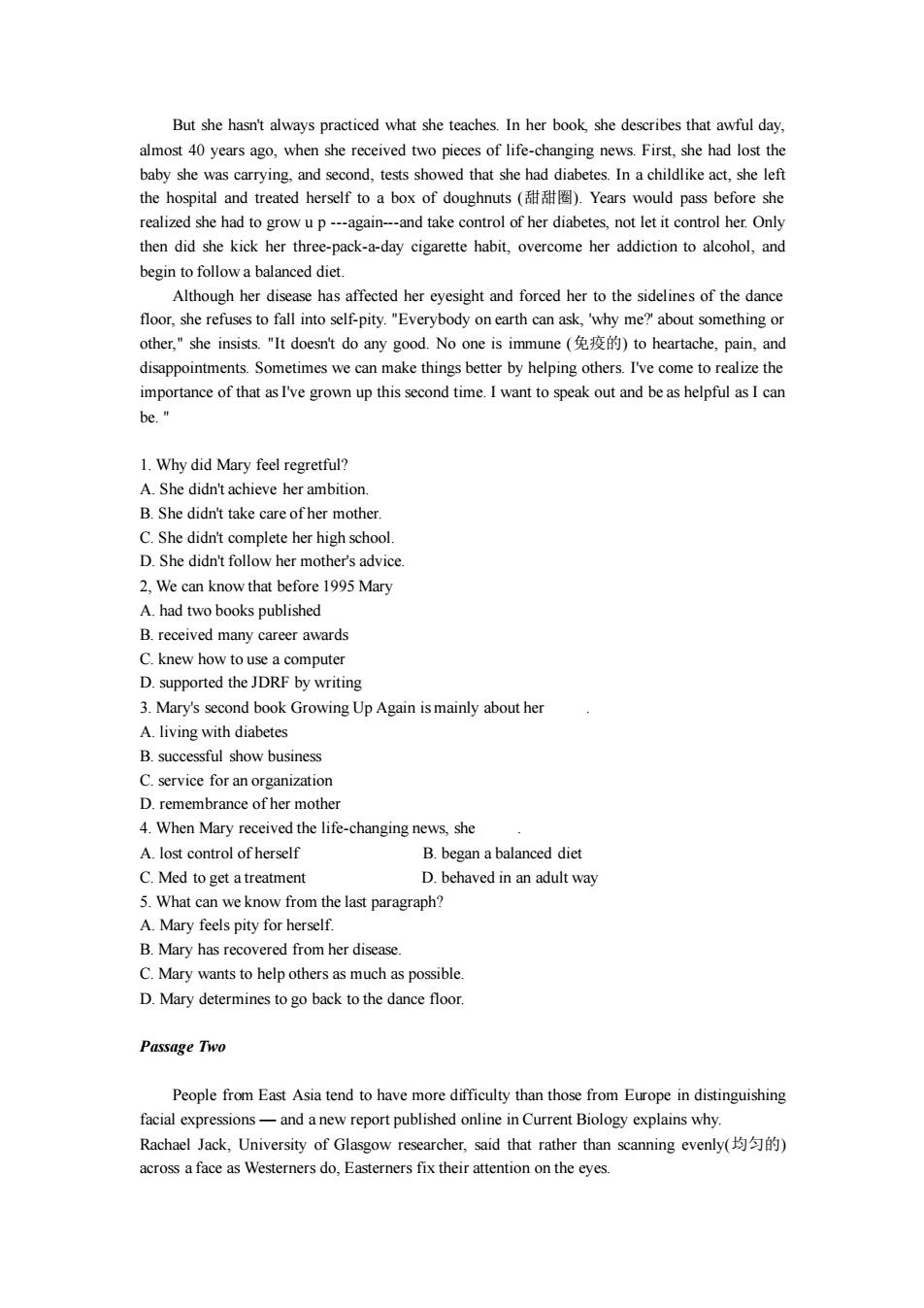
But she hasn't always practiced what she teaches.in her book she describes that awful dav almost 40 years ago,when she received two pieces of life-chang ging news First,she had ost th baby she was carrying,and second,tests showed that she had diabetes.In a childlike act,she left the hospital and treated herself to a box of doughnuts ()Years would pass before she realized she had to grow u p-again-and take control of her diabetes,not let it control her.Only then did she kick her three-pack-a-day cigarette habit.overcome her addiction to alcohol.and begin to follow a balanced die though her dis ase has affected her eyesight and forced her to the sidelines of the dance floor,she refuses to fall into self-pity."Everybody on earth can ask,why me?about something or other."she insists."It doesn't do any good.No one is immune (to heartache.pain.and disappointments.Sometimes we can make things better by helping others.I've come to realize the importance of that asI've grown up this secnd time.I wantto eak out and be as helpful as i can be." 1.Why did Mary feel regretful? A.She didn't achieve her ambition B She didn't take care of her mothe C.She didn't low her mother's a 2.We can know that before 1995 Mary A had two books published B.received many career awards 3.Mary's second book Growing Up Again is mainly about her A.living with diabetes B successful show business C service for an organizatio 4.When Mary received the life-changing news,she A.lost control of herself B.began a balanced diet C Med to get atreatment D.behaved in an adult way 5.What can we know from the last paragraph? A.Mary feels pity for herself B.Mary has recovered from her disease C.Mary wants to help others as much as possible D.Mary determines to go back to the dance floor Passage Two People from East Asia tend to have more difficulty than those from Europe in distinguishing facial expressions and a new report published online in Current Biology explains why. Rachael Jack,University of Glasgow researcher,said that rather than scanning evenly() across a face as Westerners do,Easterners fix their attention on the eyes
But she hasn't always practiced what she teaches. In her book, she describes that awful day, almost 40 years ago, when she received two pieces of life-changing news. First, she had lost the baby she was carrying, and second, tests showed that she had diabetes. In a childlike act, she left the hospital and treated herself to a box of doughnuts (甜甜圈). Years would pass before she realized she had to grow u p -again-and take control of her diabetes, not let it control her. Only then did she kick her three-pack-a-day cigarette habit, overcome her addiction to alcohol, and begin to follow a balanced diet. Although her disease has affected her eyesight and forced her to the sidelines of the dance floor, she refuses to fall into self-pity. "Everybody on earth can ask, 'why me?' about something or other," she insists. "It doesn't do any good. No one is immune (免疫的) to heartache, pain, and disappointments. Sometimes we can make things better by helping others. I've come to realize the importance of that as I've grown up this second time. I want to speak out and be as helpful as I can be. " 1. Why did Mary feel regretful? A. She didn't achieve her ambition. B. She didn't take care of her mother. C. She didn't complete her high school. D. She didn't follow her mother's advice. 2, We can know that before 1995 Mary A. had two books published B. received many career awards C. knew how to use a computer D. supported the JDRF by writing 3. Mary's second book Growing Up Again is mainly about her . A. living with diabetes B. successful show business C. service for an organization D. remembrance of her mother 4. When Mary received the life-changing news, she . A. lost control of herself B. began a balanced diet C. Med to get a treatment D. behaved in an adult way 5. What can we know from the last paragraph? A. Mary feels pity for herself. B. Mary has recovered from her disease. C. Mary wants to help others as much as possible. D. Mary determines to go back to the dance floor. Passage Two People from East Asia tend to have more difficulty than those from Europe in distinguishing facial expressions — and a new report published online in Current Biology explains why. Rachael Jack, University of Glasgow researcher, said that rather than scanning evenly(均匀的) across a face as Westerners do, Easterners fix their attention on the eyes
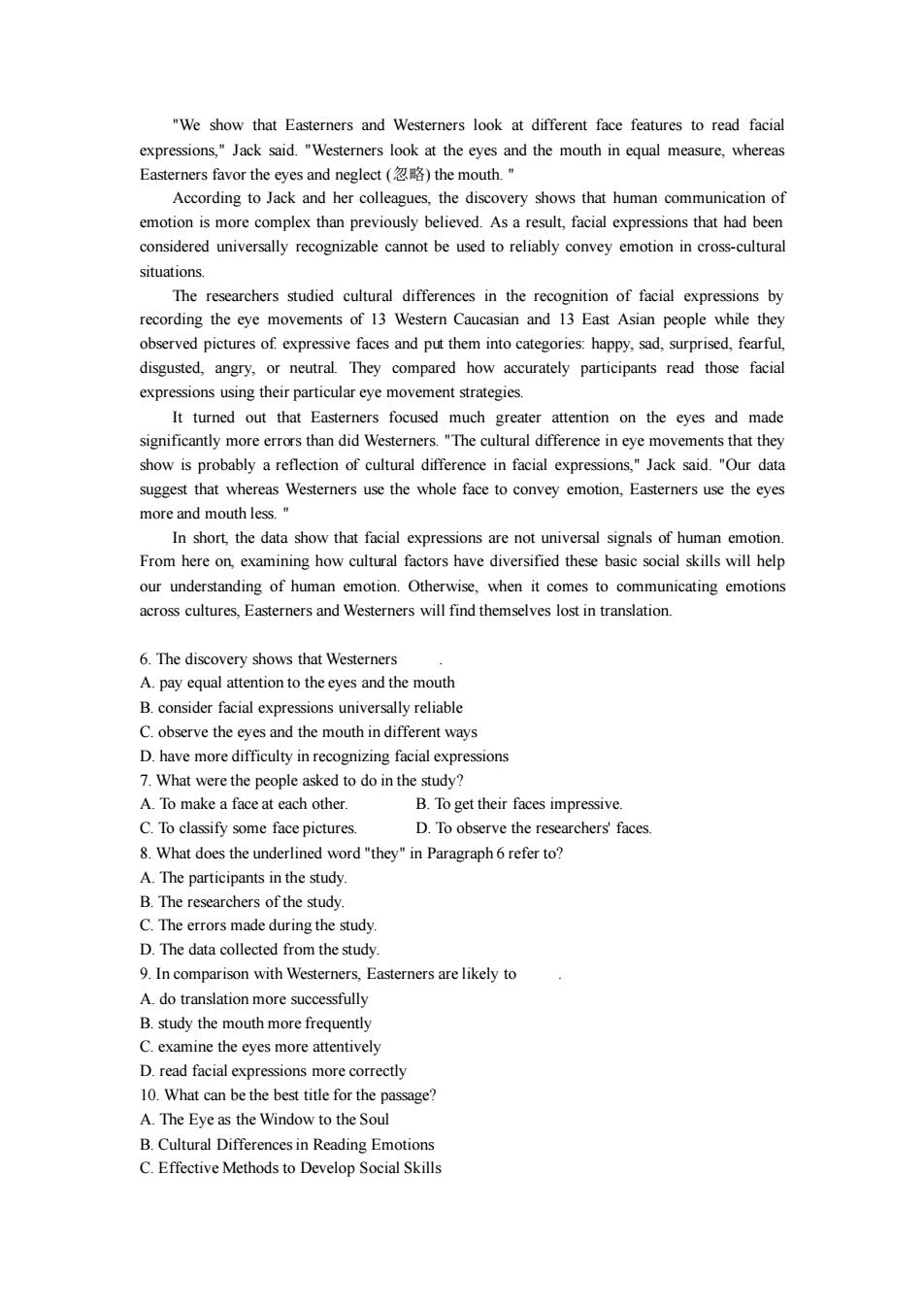
"We show that Easterners and Westerners look at different face features to read facial ook a the the mouth whereas Easterners favor the eyes ar d neglec t(忽略)the mouth. According to Jack and her colleagues,the discovery shows that human communication of emotion is more complex than previously believed.As a result,facial expressions that had been considered universally recognizable cannot be used to reliably convey emotion in cross-cultural situations. recording the eye movements of 13 Western Caucasian and 13 East Asian people while they observed pictures of expressive faces and put them into categories:happy,sad,surprised,fearful. disgusted,angry,or neutral.They compared how accurately participants read those facial expressions using their particular eye movement strategies. focused much greate attention on the eyes made significantly more than did cultural difference ineye movements that they show is probably a reflection of cultural difference in facial expressions,"Jack said."Our data suggest that whereas Westerners use the whole face to convey emotion,Easterners use the eyes more and mouth less." In shor,the data show that facial not univer rsal signals of human emotion From here onexamining how cutral fa ctors have diversified these basic l ill help our understanding of human emotion.Otherwise,when it comes to communicating emotions across cultures,Easterners and Westerners will find themselves lost in translation. 6 The discovery shows that Westerners to the eyes and the mouth C.observe the eyes and the mouth in different ways D.have more difficulty in recognizing facial expressions 7.What were the people asked to do in the study? A.To make a face at each other B.Toget their faces impressive C.To classify some face pictures D.To observe the researchers faces 8.What does the underlined word "they"in Paragraph 6 refer to? A.The participants in the studv B.The researchers of the study C.The errors made during the study. D.The data collected from the stud 9.Incomparison with Westerners,Easterners are likely to A.do translation more successfully B.study the mouth more frequently C.examine the eyes more attentively D read faciale 10.What can be the best title for the passage? A.The Eye as the Window to the Soul B.Cultural Differences in Reading Emotions C.Effective Methods to Develop Social Skills
"We show that Easterners and Westerners look at different face features to read facial expressions," Jack said. "Westerners look at the eyes and the mouth in equal measure, whereas Easterners favor the eyes and neglect (忽略) the mouth. " According to Jack and her colleagues, the discovery shows that human communication of emotion is more complex than previously believed. As a result, facial expressions that had been considered universally recognizable cannot be used to reliably convey emotion in cross-cultural situations. The researchers studied cultural differences in the recognition of facial expressions by recording the eye movements of 13 Western Caucasian and 13 East Asian people while they observed pictures of. expressive faces and put them into categories: happy, sad, surprised, fearful, disgusted, angry, or neutral. They compared how accurately participants read those facial expressions using their particular eye movement strategies. It turned out that Easterners focused much greater attention on the eyes and made significantly more errors than did Westerners. "The cultural difference in eye movements that they show is probably a reflection of cultural difference in facial expressions," Jack said. "Our data suggest that whereas Westerners use the whole face to convey emotion, Easterners use the eyes more and mouth less. " In short, the data show that facial expressions are not universal signals of human emotion. From here on, examining how cultural factors have diversified these basic social skills will help our understanding of human emotion. Otherwise, when it comes to communicating emotions across cultures, Easterners and Westerners will find themselves lost in translation. 6. The discovery shows that Westerners . A. pay equal attention to the eyes and the mouth B. consider facial expressions universally reliable C. observe the eyes and the mouth in different ways D. have more difficulty in recognizing facial expressions 7. What were the people asked to do in the study? A. To make a face at each other. B. To get their faces impressive. C. To classify some face pictures. D. To observe the researchers' faces. 8. What does the underlined word "they" in Paragraph 6 refer to? A. The participants in the study. B. The researchers of the study. C. The errors made during the study. D. The data collected from the study. 9. In comparison with Westerners, Easterners are likely to . A. do translation more successfully B. study the mouth more frequently C. examine the eyes more attentively D. read facial expressions more correctly 10. What can be the best title for the passage? A. The Eye as the Window to the Soul B. Cultural Differences in Reading Emotions C. Effective Methods to Develop Social Skills